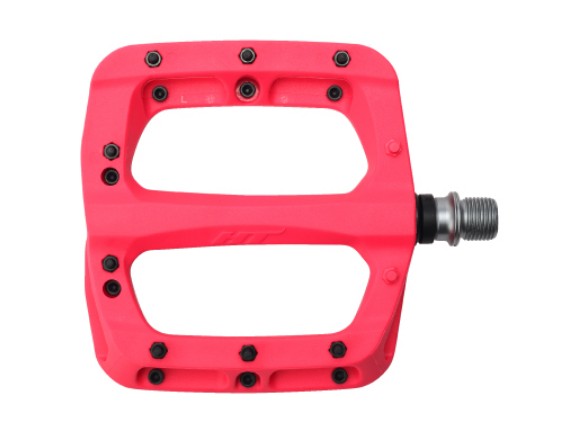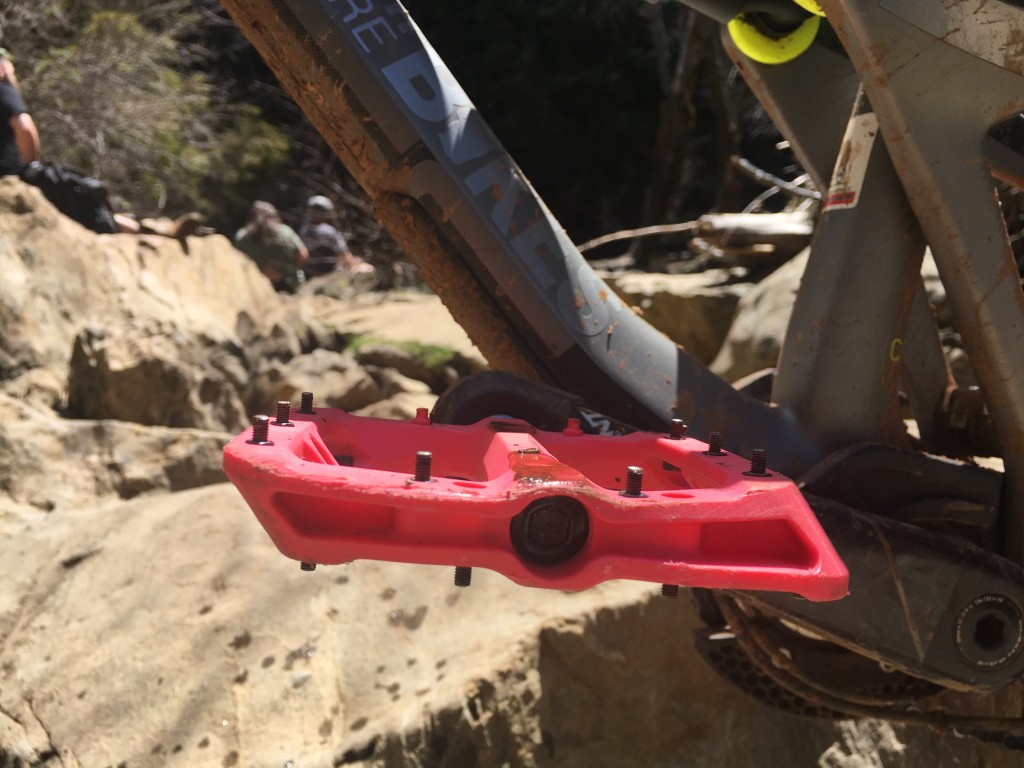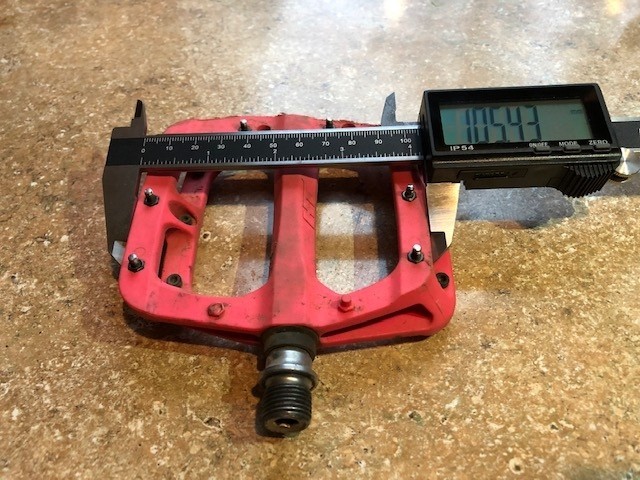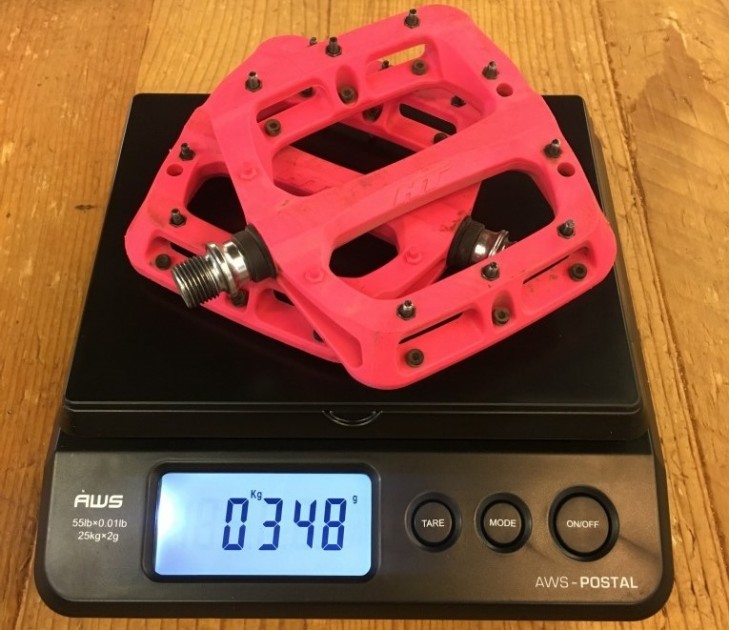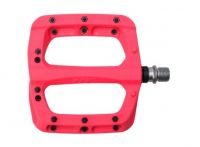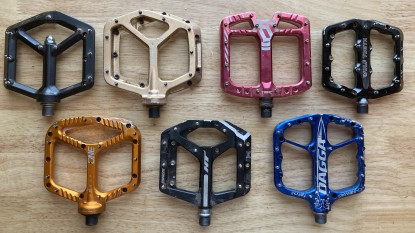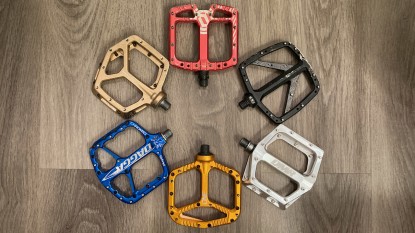HT PA03A Review

Our Verdict
Our Analysis and Test Results
While the HT PA03A pedal looks like a cheap plastic component found on a box store bike, our perceptions were quickly shattered once we headed down the trail. The ample contact area coupled with well-spaced pins makes for a playful ride, but we found that foot placement could be an issue in rough terrain. Sealed bearings give these pedals a premium feel, and pedal slop isn't an issue. Although we didn't have any pedal strikes while testing these pedals, the profile is bigger than most of the more expensive models, and we were fearful of damage to the composite body during more aggressive rides.
For a total of only ten pins on each side, the HT PA03A grips exceptionally well. The pins aren't so tall that your feet feel glued to the pedals but not so short that you would feel slipping. (Foot adjustment: moderate). The spacing of the pins allows for even grip and traction; however, the two stationary composite pins don't offer much assistance in keeping your foot where you want it. Also beware of wet, muddy conditions with this pedal. Those innermost non-removable plastic pins provide zero grip if they get smothered in mud.
Grip/Traction
The HT PA03A pedal comes with eight hex top screws pins per side, as well as two plastic injection molded pins closer to the spindle thread. The platform itself has only the slightest concavity, but our shoes felt well-planted above the spindle. These pins are set in a symmetrical pattern around the perimeter of the pedal body, creating a consistent feel on each side of your shoe. Unlike some the other pedals tested, the PA03A is missing traction pins directly over the pedal axle. This leaves a large contact area of the plastic body, which can feel slightly slippery when wet or dusty.
The PA03A rips in sharp corners, and it's easy to take a foot off to cut a sharp turn, and just as easy to put it back on. These pedals are at home in the jumps, where extracting your shoe from the pins and re-engaging it quickly is paramount for executing tricks. This same playfulness does cause some shoe-pedal chatter while charging through chunky rock gardens, and we found our foot placement wandering.
Platform
The classic BMX pedal styling found in the HT PA03A allows for a large contact space, even if the platform dimensions land it in the middle of the pack of pedals tested. The square platform made it perfect for dirt jumping, giving our feet a wide area to distribute the load on large impacts. The concavity was almost nonexistent, measured at about 0.5mm along the middle of the pedal. A little more depth would have helped to keep our feet more planted on the pedals through rock gardens. The PA03A had one of the thickest profiles of all the pedals tested, measuring in at just over 18mm on the leading edge. While we didn't have any pedal strikes while riding these pedals, we foresee this being inevitable with the larger profile, which could lead to severe damage to the composite pedal body.
Mobility
With two sealed bearings and the spindle riding on a DU bushing, these pedals spin well for one of the cheaper pedals we reviewed. We had no issues finding the flat side of the pedal when jumping into the saddle and the pedal body stays in position when we take our feet off when throwing tricks. When standing up and cranking down hard on the pedals, we didn't notice any creaking or spindle slop of any kind. After repeated abuse on our enduro bikes, our take is that the PA03A continues to pedal as if it just came out of the box.
Servicing
While the body of the platform is built out of a nylon composite material, all the other components could be found on a much more expensive pedal. The CNC machined Chromoly spindle is easy to access via a hex key. This will allow you to service or replace the two sealed bearings and the bushing found inside. Eight of the ten pins on each side of the pedal are replaceable hex head screws, just in case you lose or destroy one on an errant rock. Because the pedal body is constructed of a nylon composite, this limits both the material thickness and the structural integrity of the pedals.
Although the PA03A does have sealed bearings and an aluminum spindle, we couldn't comply with buying replacement parts for this pedal considering the low price point of these pedals. Searching for the rebuild kit for these puppies is a little tricky. You need to make sure you find the kit that is for the Nano Series HT pedal. They have a plethora of pedals, and it can be a confusing search.
Weight
Although they aren't made of space-age metal alloys, the HT PA03A pedals weigh in at a respectable 348-grams per pair. We aren't too worried about being weight-weenies with this pair of pedals since they are some of the least expensive pedals we reviewed. Still, we wouldn't suggest putting these on your enduro racer or downhill rig to shave a bit of weight.
Value
At their retail price, you can't ask for much more from these pedals. The pins grip our sticky rubber shoes well in most circumstances, and the platform is large enough to accommodate even the largest of foot sizes. These pedals even include sealed bearings that keep them spinning as smoothly as other pedals tested. While they didn't perform the best in technical terrain, they excelled in the berms and the jumps. Even if you happen to destroy one by crashing into rocks, a replacement pair is a third the price of some of the more expensive pedals we tested. We would rather buy three pairs of the PA03A in some cases.
Conclusion
The HT PA03A performed well in various terrain we tested it in and felt just as well designed as other more expensive pedals. We could only surmise that one of the negatives of the pedal was its relatively soft-pedal body, although we didn't end up crashing it into rocks to test this theory. We only griped about these pedals when charging down long rock gardens and felt our shoes bouncing on the platform a bit more than usual.
| Awards | |
|---|---|
| Price | $55 List Check Price at Amazon |
Overall Score  |
|
| Star Rating | |
| Bottom Line | While not built to take abuse from technical terrain, these composite pedals are great for the flow trails |
| Pros | Large platform, sealed bearings, classic BMX style |
| Cons | Slippery when wet, composite plastic body, shoe chatter in rock gardens |
| Rating Categories | HT PA03A |
| Grip and Traction (25%) | |
| Platform (25%) | |
| Mobility (20%) | |
| Servicing (15%) | |
| Weight (15%) | |
| Specifications | HT PA03A |
| Measured Weight (per pair) | 348 g |
| Traction Pins (per side) | 10 total: 8, 2.5 mm hex head bottom loading & 2 fixed composite traction pins |
| Measured Platform Dimensions (millimeters) | 107 mm x 105 mm |
| Platform Profile (millimeters) - not including pins | 18 mm leading and trailing edges, 17 mm at center of spindle |
| Concavity | 1 mm difference from effective edges to middle of axle |
| Q Factor / Distance from cranks to furthest pin | 114 mm |
| Bearings | Dual sealed bearings plus one DU bushing |
| Body Material | Nylon reinforced composite |
| Pedal Wrench Type | 6 mm hex |


